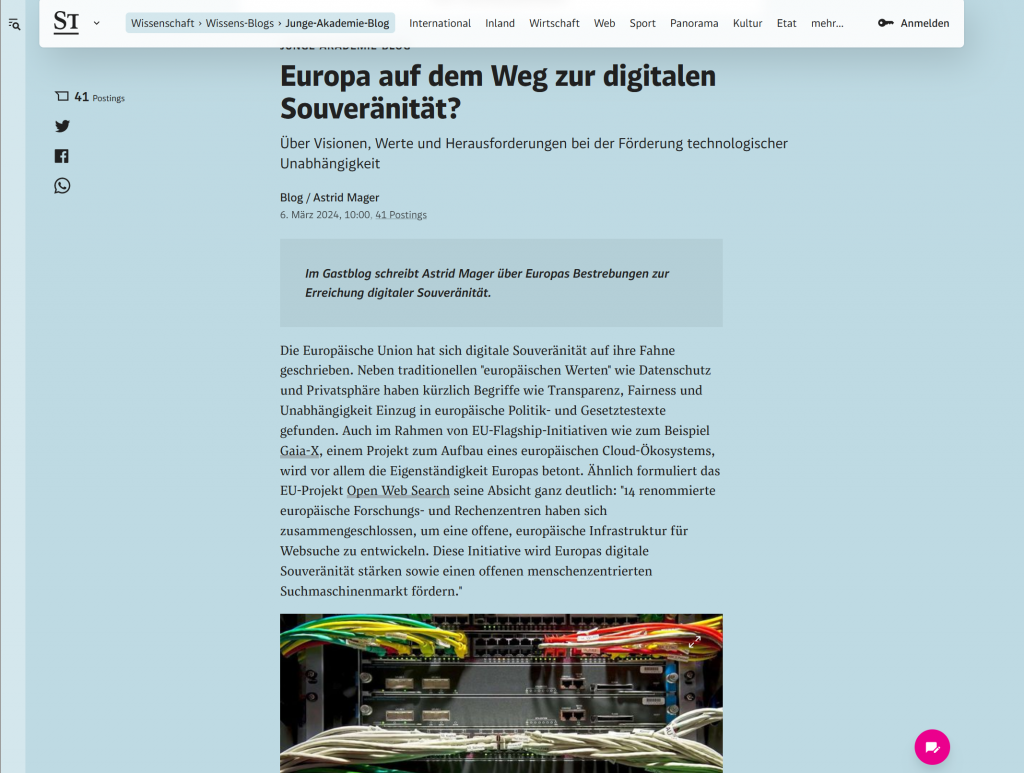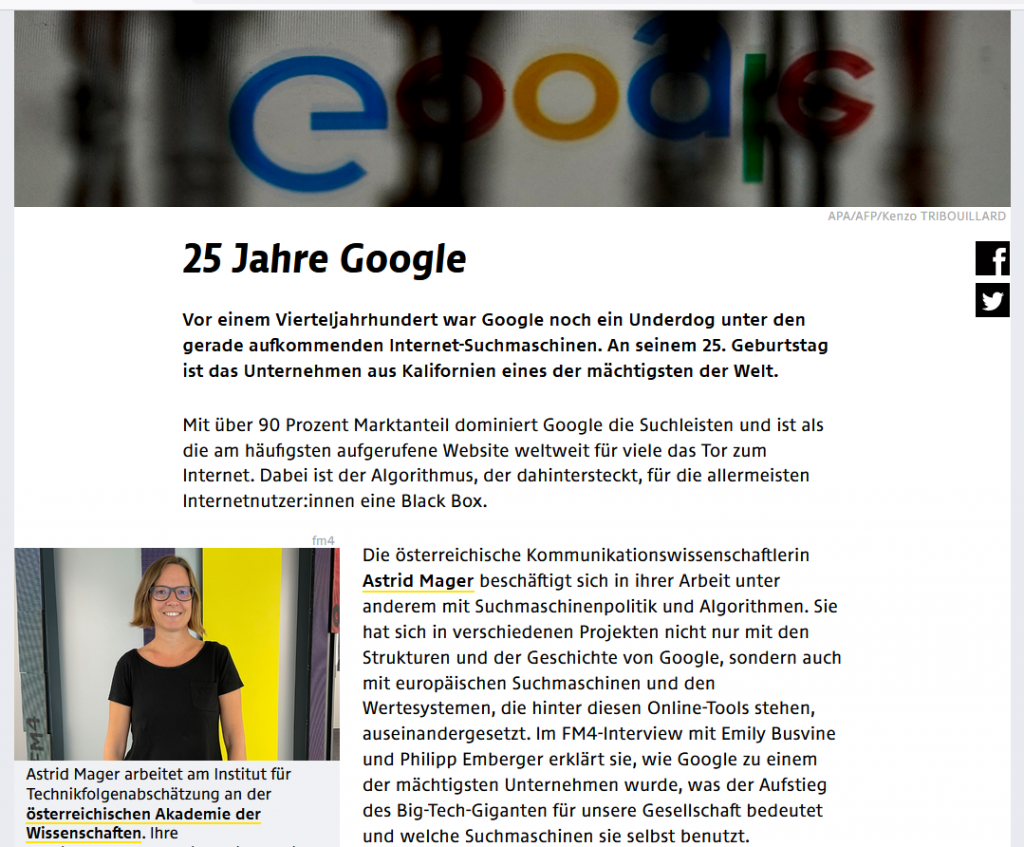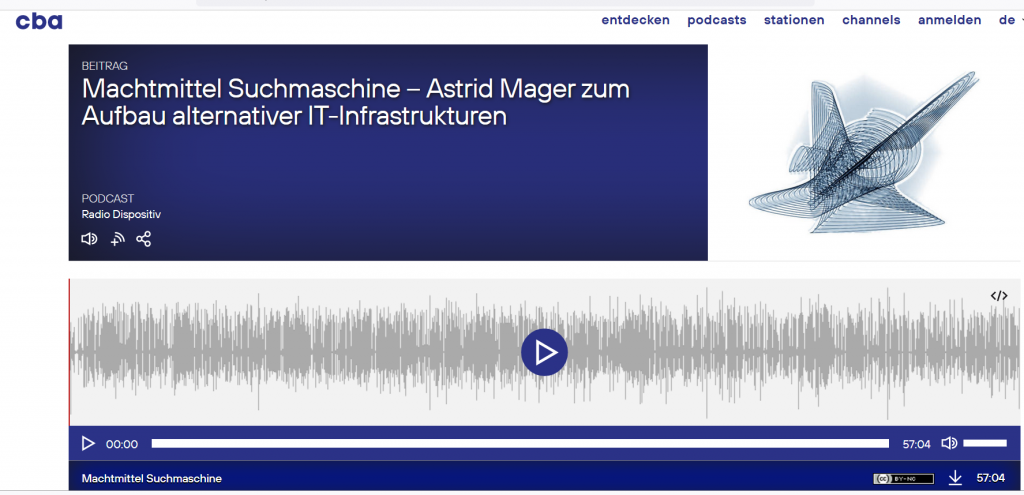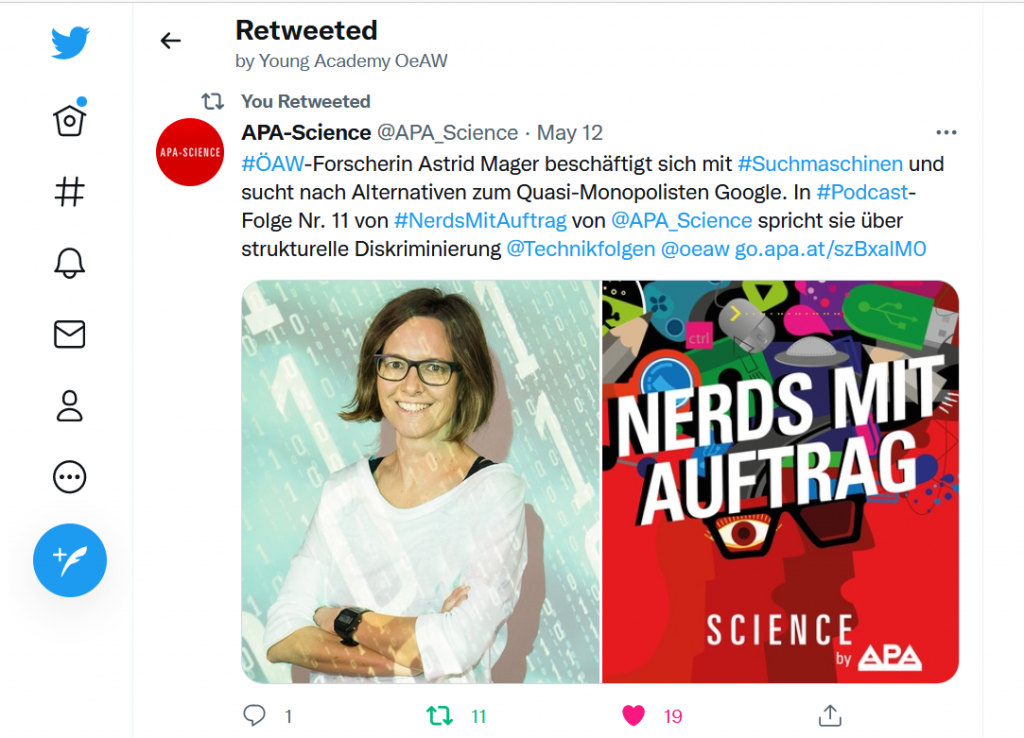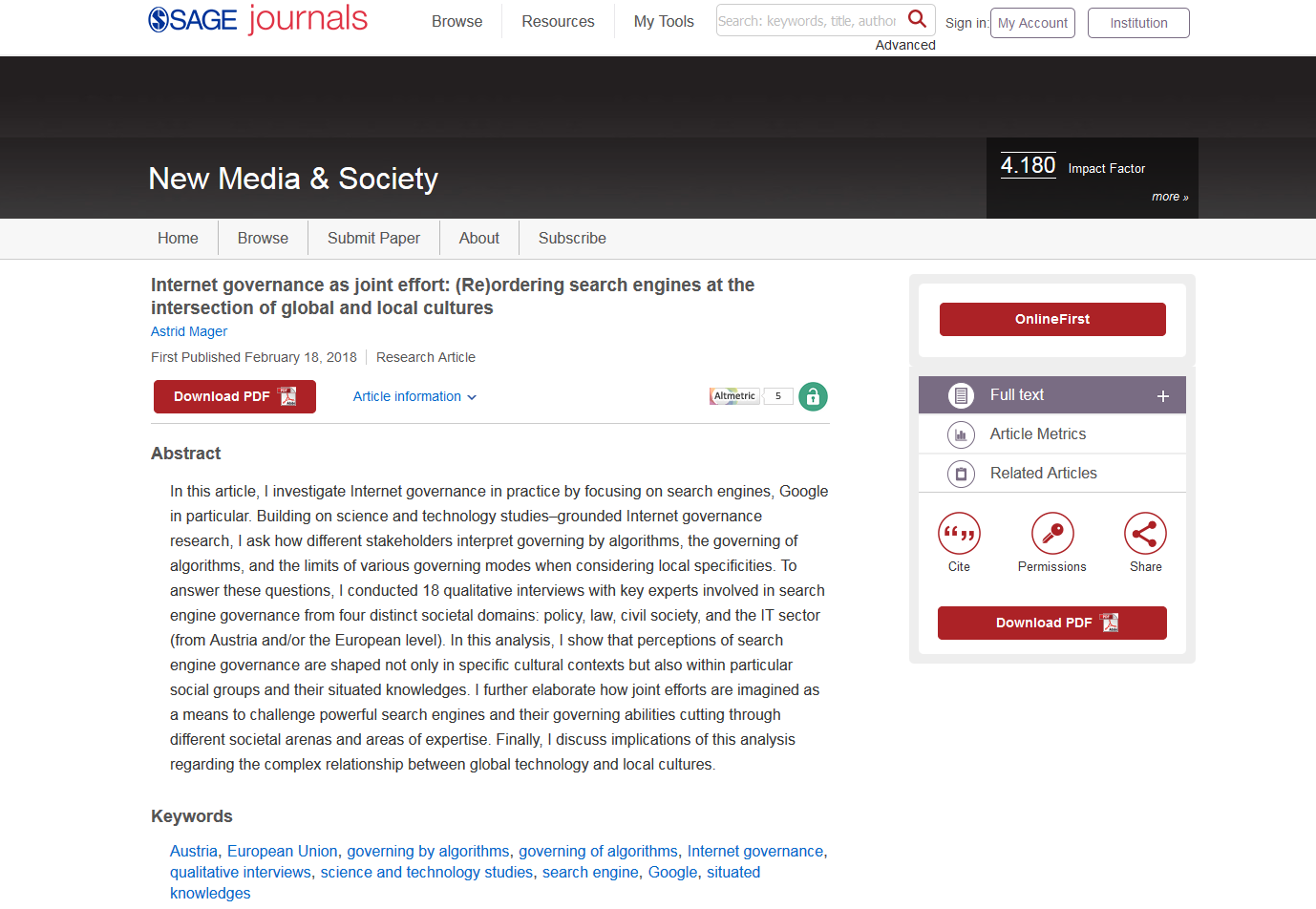Please have a look at the blog post I wrote for the Austrian daily newspaper DerStandard. It’s part of the blog post series of the Young Academy of the Austrian Academy of Sciences. And it deals with the Eurpean way towards digital sovereignty with a question mark at the end 😉 – in German.
Tag Archives: europe
You’re at home baby
Letzte Woche war ich zur Abwechslung mal bei Jugendradio! Fein wars!! Mit Dank an Veronika Weidinger für die Einladung! Interview und Podcast zum Nachhören gibts hier:
Talk Radio: Machtmittel Suchmaschine
Im Oktober habe ich mal wieder mit Herbert Gnauer über Suchmaschinen diskutiert (Radio Dispositiv auf Orange, 94.0). Genauer über alternative Suchmaschinen, sowie den Aufbau offener – öffentlich finanzierter – IT Infrastrukturen. Ein offener Web Index könnte die Grundlage für die Entwicklung von ganz unterschiedlichen Suchmaschinen, Ranking-Instrumenten, und Applikationen sein. Er könnte dem gegenwärtigen Monopolisten (Google) eine reichhaltige, buntere, diversere Suchmaschinenlandschaft entgegensetzen. Diese würde wesentlich besser zu unseren “europäischen Werten” – und hier insbesondere dem pluralen, multikulturellen, und diversen Europa – passen, als hegemoniale Ansprüche ein “europäisches Google” zu bauen, dem Europa kaum gerecht werden kann – alleine schon deshalb, weil Europa ganz anders funktioniert als die USA (und China) – Stichwort Datenschutz, aber auch kulturelle Eigenheiten, verschiedene Sprachen, fragmentierte Märkte etc, die es positiv nutzbar zu machen gilt! Ein offener Web Index – wie übrigens auch das dezentrale social network Mastodon – halten daher nicht nur alternative, verteilte, nachhaltigere Technologien für uns bereit, sondern auch alternative Imaginationen von Europa, die es weiter zu verfolgen gilt.
Zwei Initiativen machen sich hier insbesondere starkt: Die Open Web Index Initiative und die Open Search Foundation, die beide den Aufbau einens offenen Web Indexes anstreben. Es lohnt sich diese großartigen Projekte im Detail unter die Lupe zu nehmen!
Vielen Dank Herbert, dass Du diesen Ideen Raum in Deiner Sendung geboten hast! Es ist mir immer wieder eine Freude! Spoiler: zwei wiss. Artikel dazu sind gerade im Erscheinen (Big Data & Society) & in Begutachtung (book Project Europe) – more info coming soon!
Link zur Sendung Dispositiv auf Radio Orange 94.0: Machtmittel Suchmaschine – Astrid Mager zum Aufbau alternativer IT-Infrastrukturen
podcast time
If you’re interested in corporate search engines from the US and alternative search infrastructures from Europe listen to these two podcasts that were produced by the Austrian Press Agency (APA Science, Nerds mit Auftrag) and the Austrian Academy of Sciences (MAKRO MIKRO); both in German. 
media coverage
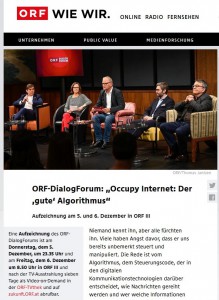 Last year, my work has been covered by various media outlets and events. First, the Austrian Academy of Sciences (ÖAW) made a portrait/ interview with me on the way visions and values shape search engines as part of their series “Forschen für Europa”. This piece included a fancy foto shooting, as you can see here. Second, I was invited to take part in the panel discussion of the ORF Public Value event “Occupy Internet. Der gute Algorithmus” (together with Tom Lohninger from epicenter.works, Matthias Kettemann from the Hans-Bredow-Institut and Franz Manola from the ORF Plattformmanagement). The live discussion took place at the “Radiokulturhaus” and was aired in ORF 3 thereafter. Here you can find the abstract, the press release and the video in case you want to watch the whole discussion. Finally, I was invited as a studio guest to the radio broadcast “Punkt 1” at Ö1 “Das eingefärbte Fenster zur Welt“, where I spoke about alternative search engines and people could phone in and ask questions per email. Talk radio it is! 😉 – all in German.
Last year, my work has been covered by various media outlets and events. First, the Austrian Academy of Sciences (ÖAW) made a portrait/ interview with me on the way visions and values shape search engines as part of their series “Forschen für Europa”. This piece included a fancy foto shooting, as you can see here. Second, I was invited to take part in the panel discussion of the ORF Public Value event “Occupy Internet. Der gute Algorithmus” (together with Tom Lohninger from epicenter.works, Matthias Kettemann from the Hans-Bredow-Institut and Franz Manola from the ORF Plattformmanagement). The live discussion took place at the “Radiokulturhaus” and was aired in ORF 3 thereafter. Here you can find the abstract, the press release and the video in case you want to watch the whole discussion. Finally, I was invited as a studio guest to the radio broadcast “Punkt 1” at Ö1 “Das eingefärbte Fenster zur Welt“, where I spoke about alternative search engines and people could phone in and ask questions per email. Talk radio it is! 😉 – all in German.
internet governance as joint effort
Out now: my article “Internet governance as joint effort: (Re)ordering search engines at the intersection of global and local cultures” has just been published by New Media & Society. Or at least in its online first version! I’m very happy about it!! & welcome every feedback or commentary. Here’s the preprint version, if you don’t have access to the journal (or you just send me an email for the original version). yipiiiiehhhh 🙂
(un)making europe
 Tomorrow I’ll be going to the conference by the European Sociological Association in Athens. The conference theme is (Un)Making Europe. Capitalism, Solidarities, Subjectivities. I’ll be giving a talk on the co-production of search technology and a European identity in the session “information technologies & society” organized by Harald Rohracher. It’s related to my article “search engine imaginary” that got published in Social Studies of Science just recently. It’s pretty unusual for me to give a talk about finished work, but I thought I had to submit something since this research corresponds to the overall conference topic so well. 😉
Tomorrow I’ll be going to the conference by the European Sociological Association in Athens. The conference theme is (Un)Making Europe. Capitalism, Solidarities, Subjectivities. I’ll be giving a talk on the co-production of search technology and a European identity in the session “information technologies & society” organized by Harald Rohracher. It’s related to my article “search engine imaginary” that got published in Social Studies of Science just recently. It’s pretty unusual for me to give a talk about finished work, but I thought I had to submit something since this research corresponds to the overall conference topic so well. 😉
Here’s the conference abstract and the link to the full paper:
(Un)Making Europe in the Context of Search Engine Policy
This article discusses the co-production of search technology and a European identity in the context of the EU data protection reform. The negotiations of the EU data protection legislation ran from 2012 until 2015 and resulted in a unified data protection legislation directly binding for all European member states. I employ a discourse analysis to examine EU policy documents and Austrian media materials related to the reform process. Using the concept ‘sociotechnical imaginary’, I show how a European imaginary of search engines is forming in the EU policy domain, how a European identity is constructed in the envisioned politics of control, and how national specificities contribute to the making and unmaking of a European identity. I discuss the roles that national technopolitical identities play in shaping both search technology and Europe, taking as an example Austria, a small country with a long history in data protection and a tradition of restrained technology politics.
search engine imaginary
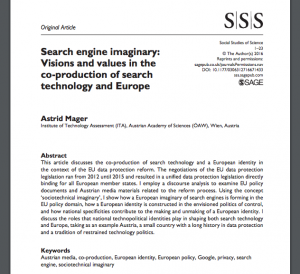 The first empirical article of my project “Glocal Search” is online now: “Search engine imaginary. Visions and values in the co-production of search technology and Europe”! It has been published by the peer-reviewed journal Social Studies of Science, which makes me very proud! I’d like to thank all people who helped me refining my article – especially my ITA colleagues, Max Fochler, SSS editor Sergio Sismondo and three anonymous reviewers who all provided thorough and constructive feed-back and suggestions! I further like to thank my family for letting me work while being on maternity leave!! I’m very confident with the final outcome!
The first empirical article of my project “Glocal Search” is online now: “Search engine imaginary. Visions and values in the co-production of search technology and Europe”! It has been published by the peer-reviewed journal Social Studies of Science, which makes me very proud! I’d like to thank all people who helped me refining my article – especially my ITA colleagues, Max Fochler, SSS editor Sergio Sismondo and three anonymous reviewers who all provided thorough and constructive feed-back and suggestions! I further like to thank my family for letting me work while being on maternity leave!! I’m very confident with the final outcome!
The online first version (plus abstract) can be found here; just drop me a line if you don’t have access – I’ll (very secretly) send you a copy then.. 😉 I would love to hear what you think about it since the whole field of Internet Governance is one that I just recently entered – the great AOIR workshop “The Internet Rules, But How?”, organized by Dmitry Epstein, Christian Katzenbach, Francesca Musiani & Julia Pohle, was a very good entry point by the way! Also, the related special issue by the journal Internet Policy Review on “Doing internet governance: practices, controversies, infrastructures, and institutions” is a good read. It’s open access and free of charge!
information society @ the crossroads, 3-7 june 2015
 We’re happy that we got almost 20 papers for our panel “ICTs and power relations. Present dilemmas and future perspectives” (a panel I co-organize with my ITA colleagues Doris Allhutter & Stefan Strauss). Thanks to the conference organizers we’ll be able to put together two (maybe even three) sessions! YAY. We’ll go through all the abstracts in the next couple of weeks.. I’m already looking forward to that!
We’re happy that we got almost 20 papers for our panel “ICTs and power relations. Present dilemmas and future perspectives” (a panel I co-organize with my ITA colleagues Doris Allhutter & Stefan Strauss). Thanks to the conference organizers we’ll be able to put together two (maybe even three) sessions! YAY. We’ll go through all the abstracts in the next couple of weeks.. I’m already looking forward to that!
That’s the abstract I submitted. I hope it will make it through our tough review process! 😉 Comments & thoughts are highly welcome!!
Algorithmic Imaginaries. Visions and values in the co-production of search engine politics and Europe
Information and communication technologies (ICTs) have been described as transcending and transforming national borders, political regimes, and power relations. They have been envisioned as creating a global network society with hubs and links rather than cities and peripheries; “technological zones” (Barry 2006) rather than political territories. This reordering of distance and space was described as going hand in hand with processes of reordering social life. Such deep entanglements of technological and social arrangements have been coined as processes of co-production (Jasanoff 2005). While this “sociotechnical imaginary of the internet” (Felt 2014) was framed as all-encompassing and world-spanning at first, it is now increasingly seen as conflicting with the diversity of cultural, political, and social values on the ground. Accordingly, alternative interpretations of ICTs and their multiple socio-political implications have emerged over the past years.
Especially in the European context, tensions between US-American internet services, Google and its “algorithmic ideology” (Mager 2012, 2014) most importantly, and European visions and values may be observed. After the NSA scandal critical voices have become louder and louder; both in the policy and the public arena. Out of a sudden, issues like privacy, data protection, informational self-determination, and the right to be forgotten have been conceptualized as core European values (even though European secret services heavily surveilled its citizens too – arguable more intensely than the NSA in the British case). This shows that there is a European voice forming that aims at distancing and emancipating Europe from US-American tech companies and their business models based on user-targeted advertising and large-scale citizen surveillance. However, it further shows that there are tensions running through European countries and their national interests, identities and ideologies too. One reason is that Europe is neither a clear-cut, homogeneous entity, nor fixed and stable. In the context of biotechnology policy Jasanoff (2005: 10) argues: “Europe in particular is a multiply imagined community in the minds of the many actors who are struggling to institutionalize their particular versions of Europe, and how far national specificities should become submerged in a single European nationhood – economically, politically, ethically – remains far from settled.”
So how is Europe imagined in the context of search engine politics and how are search engines imagined in Europe? And how does the European imaginary relate to national visions and values of search engines? These are the main questions to be answered in the presented analysis by taking Austria as a case study. Analyzing European policy discourses the study examines how search engines – Google in particular – are imagined in the European policy context, what visions and values guide search engine politics, and how Europe is constructed in these narratives. Analyzing Austrian media debates the project investigates how the European imaginary is translated into and transformed in the Austrian context, how Google is portrayed in these debates, and what national specificities shape the narratives. A particular focus is put on the ongoing negotiation of the European data protection reform since this is a central arena where search engines (and other data processing technologies like social media etc) and the European identity are co-constructed these days, but also a site where European disparities, national interests, and local value-systems are at stake. Using a discourse analytical approach and the concept of “sociotechnical imaginaries” (Jasanoff and Kim 2009) this study will give insights in the way ICTs and Europe are co-produced, but also what tensions and contradictions appear between the European imaginary and national interests. While European policy documents try to speak with one voice, the Austrian media shows more nuanced stories of power relations, struggles, and friction that open up the view on the fragility of the European identity when it comes to sensitive, value-laden areas like search engine politics.
Google is a particularly interesting technology in this respect since Google was one of the first US-American tech companies that came under scrutiny in the European context. In 2010 Google tried to launch its street view service on the European market. Rather than euphorically embracing the service, however, European citizens, NGOs, and policy makers went on the barricades and started protesting against Google cars in various cities and regions. An Austrian farmer, for example, sparked media publicity by attacking a Google car with a pickaxe. After Google’s illegal scraping of open WiFi data Google cars were banned from Austrian streets for some time (not surprisingly the service was continued later on after Google accepted some restrictions). While the street view debate was the first one that had values like privacy and data protection at its core, the issue was handled nationally back then. Every European country took different actions according to their stance towards the service (varying from unrestricted acceptance in some countries to (initial) blockage in others).
Despite these differences among European countries (or also because of them), a European vision – a European “algorithmic imaginary” – started to form in the aftermath of the street view debate. While it was only a silent voice at first, it grew into a stronger message that took its written form in the first draft of the European data protection reform that was launched in early 2012. Since then various actors tried to force their interests into the legislative text – most prominently the US-American IT industry, but also European NGOs and national stakeholders; some of them started lobbying even before the European Commission presented its very first draft. These heavy negotiations show how important this piece of text is for multinational actors doing business on the European market. Even though the reform is far from being finished, the judgment of the “right to be forgotten” that forced Google to obey European law may be seen as a first step towards putting the European imaginary into practice. The Austrian media frames this case as a success in showing US-American IT companies like Google that making business on the European market requires obeying European law. Looking more closely and integrating national visions and values into the analysis, however, indicates how fragile the European imaginary still is, and what tensions and contradictions it faces when being translated into national and local contexts. It shows that Europe tries to speak with a strong voice when addressing other countries and continents, the US most importantly, but how weak its voice becomes when it is confronted with itself. The ongoing reform of the data protection reform offers particularly rich materials to trace this dynamic. It is an arena where search engines, business models, and algorithmic logics are negotiated, but also an arena where Europe is forming and falling apart – both at the same time.
So if our information society is at the crossroads, as stated in the conference abstract, we need to understand tight entanglements between technological and social arrangements before taking the next junction. Only when (re)grounding global ICTs in specific socio-political contexts alternative routes may be taken towards more democratic, more sustainable, and more culturally sensitive network technologies (whether this requires stricter regulations of US-American technologies or developing alternative “European” services, or both, remains to be seen). What we may learn from the geopolitics of search engines in terms of global power relations, European identity construction, and concepts of nationhood will be finally discussed.
Acknowledgment
The research presented in this paper is supported by the Jubilee Fund of the Austrian National Bank (OeNB), project number 14702.
References
Barry, A. (2006) Technological Zones. European Journal of Social Theory 9(2): 239-253.
Felt, U. (forthcoming) Sociotechnical imaginaries of “the internet”, digital health information and the making of citizen patients, to appear in Hilgartner S., Miller, C., and Hagendijk, R.: Science and Democracy: Making Knowledge and Making Power in the Biosciences and Beyond, London/ New York: Routledge.
Jasanoff, S. (2005) Designs on Nature. Science and Democracy in Europe and the United States, Oxfordshire: Princeton University Press.
Jasanoff, S. and S. Kim (2009) Containing the Atom: Sociotechnical imaginaries and Nuclear Power in the United States and South Korea, Minerva 47(2): 119-146.
Mager, A. (2012) Algorithmic Ideology. How capitalist society shapes search engines, Information, Communication & Society 15(5): 769-787.
Mager, A. (2014) Defining Algorithmic Ideology: Using Ideology Critique to Scrutinize Corporate Search Engines, Triple C. Cognition, Communication and Co-Operation 12(1).

